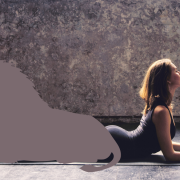
When I reached out online for someone willing to share their personal struggle with food, I was surprised to see that the first volunteer was from within my own family: my sister.
Heidi is a healthy 45-year-old high school English teacher. She is married, she golfs regularly, and she has bushels of friends. But, for more than 30 years, she has battled with her self-image and struggled to form a healthy relationship with food.
“I can probably go back to being in grade 10,” says Heidi. “I went on a … SlimFast diet. I wanted to lose a total of three pounds. So, I went on a diet with Mom.”
Three pounds, at age 15. At such a young age, she was already dissecting her reflection, with the help of our mother.
By her late teens, Heidi’s concern over her weight mutated into obsession.
“I spent a lot of time not eating, and spent time just drinking a lot of Diet Coke and thinking that I should just lose some weight. My perception of myself versus the people I was hanging out with was that I was the heaviest one there.
“I would see a picture and I would think, ‘That’s terrible.’ That was about the time I really just started avoiding food and replacing it with things that didn’t have calories. Because my understanding was that calories are what makes you fat.”
Unfortunately, as with cases of body dysmorphia, my sister’s self-image didn’t match the way she appeared to those who knew her. But, for her, limiting her food intake was a method of managing what she could, when other aspects of her life became detrimental to her well-being.
“There was a bad relationship, which definitely had an impact on me. That’s where I think the control thing started. The only thing I felt like I could control was what I put in my mouth. And I needed to stay small.”
Thankfully, by the time she was in her late twenties, Heidi’s closest friends noticed her struggle with weight was becoming unhealthy. Through their support, she was urged into therapy. There she learned to modify her perspective toward food, as well as toward her own body.
“I don’t know if it’s healthier, or if it’s just different and a little more mature. I can sort of rationalize away thinking, ‘Oh my God, you are the heaviest one in the room.’ Or, ‘You need to be at the end of certain photos.’ I eat to nourish, I guess; I don’t eat to cover myself.”
Like my sister, so many of us rely on outside cues—whether real or imagined—which then dictate what we eat or how we feel about ourselves. Sometimes those cues are sparked by our own mirrors—an unrealistic self-portrait. Fortunately, my sister was ultimately surrounded by the right people, whose love for her allowed her to rediscover a healthy love of food.







